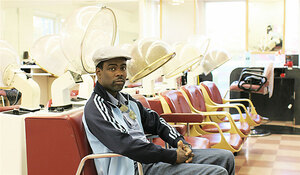‘Good Hair’ doesn’t address the root of the matter
Fifteen years ago, Chris Rock got the idea to create a documentary depicting the struggles various hair types pose, and the ramifications of “fashionable” hair styles within the black community. When his daughter asked him, “Daddy, how come I don’t have good hair?” Rock jumped into action to solve the issue for her, but also to initiate a dialogue within society at large.
Rock’s Good Hair shines a light on the absurdity of black hair care through a series of events that reach a climax at the Bronner Bros. International Hair and Beauty Show — the largest convention and competition of black hair products and styling in the world. This show is so ridiculous it cannot be adequately described in words, and is completely worthy of its own documentary. It is the only show of its kind, a place where competing stylists are considered trite if they cut their models’ hair while hanging upside-down.

Air dry · Chris Rock executive produced and co-wrote Good Hair, a new documentary that examines the reasoning behind hair trends in the black community, particularly among women. The documentary features interviews with Maya Angelou, Rev. Al Sharpton and Nia Long, among others. - Photo courtesy of Roadside Attractions
Rock’s documentary intercuts the build up to the Bronner Bros. fiasco with interviews from stylists, product gurus, black celebrities, barber shop patrons and employees. Even Maya Angelou and Rev. Al Sharpton offer their perspectives on the use of relaxers, wigs and weaves. Rock takes us through unexpected territories, including corner store weave shops, Indian Temples and black market merchants. With comedic expertise, he demonstrates the enormous spectacle black hair styles have become, but, in doing so, also washes over the heart of the issue.
Rock’s comedic approach makes the topic light enough for people of all demographics to watch and enjoy, but the documentary suffers from its reluctancy to approach any sincere depths. In nearly all the moments where the film takes the audience to a point of controversy or poignancy, it backs away. In fact, Rock himself seems to be biting his tongue when discussions of the subject begin to reach touchy levels.
For example, Rock interviews Sharpton, who says he’s been straightening his hair since James Brown got him into it during the Reagan administration (sounds like a hoot already, doesn’t it?). As a black social leader, Sharpton sees no harm in habitually rejecting the natural curl of his hair, but does take issue with the fact that most black hair care establishments are owned by white companies. The problem for Sharpton, then, is not that black people across the country are subjected to the grueling, tedious and painful treatment processes of falsifying their hair for ambiguous motives, but, rather, where the money goes. The reaction shots of Rock in this discussion all show him looking a bit confused, or maybe even mildly startled, yet he never questions Sharpton on this discrepancy.
But there are a few moments where the subtlety of the statements really pays off. Near the end of the film, actress Nia Long tells Rock, “It’s all about working with what you’ve got.”
Rock replies, facetiously, “Or weave in what you don’t.” With complete sincerity, Long agrees, prompting the audience to think critically about the nature of the statement. What message is she sending to all the little black girls across the country? The answer is the same message girls of all races receive everyday through popular media and social networks: It is their duty as females to succumb to social pressures in order to boost their physical appearance.
The overall message of the film was very confusing, and, therefore, ultimately complacent and intellectually frugal. It seemed like Rock had one idea of where he wanted to take his film, and nearly all of his interviewees had another. In short, it seemed like an awfully long journey for such a cookie-cutter answer. True, the subject is enormously complex, combining gender, race and self-esteem issues, but with the quick pace of the film combined with a runtime of only 95 minutes, Good Hair could have easily absorbed another few minutes here and there to add much needed richness to the discussion.
Good Hair is incredibly funny and certainly worth seeing. It does prompt viewers to think, even if just for a moment, about the lengths to which people are willing to go for their appearance.
